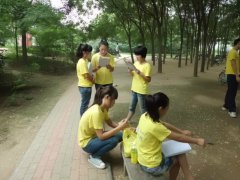标志:will / shall + 动词原形
1. 表示将来发生的动作或存在的状态,通常与表示将来的时间状语连用(e.g. tomorrow, next week, in the future等)。如:
We shall have a lot of rain next month.
My husband will come back in a few days.
2. 表示倾向性和习惯性:
Fish will die without water.
When it gets warmer, the snow will start to melt.
3. 一般将来时的几种句式结构辨析:1) will / shall + 动词原形多用于表达主观愿望或必定会发生的事情(“将会如何”)*shall作助动词时一般只用于第一人称
2) be going to + 动词原形表示即将发生或打算要做的事:
It is going to rain.
We are going to have a meeting today.
3) be to + 动词原形表示按计划或安排即将要发生的动作:
He is to visit Japan next year.
We are to discuss the report on Monday.
4) be about to + 动词原形表示即将发生的动作,意为“马上要做某事”,后面一般不跟时间状语,如:
The plane is about to start.
Don’t worry. I am about to make a close examination on you.
4现在进行时
标志:be + 动词的现在分词
1. 表示说话时正在进行的动作:
She is writing a letter upstairs.
Who are you waiting for?
It is raining hard.
2. 表示现阶段一直在进行的动作(说话时动作未必正在进行):
I hear Mr. Green is writing another novel.
3. 表示反复出现或习惯性的动作,往往包含说话者赞扬、责备、厌恶等情绪,通常与always, constantly, continually, forever等频度副词连用。如:
John is forever asking silly questions like a stupid.
He is always thinking of others first.
4. 表示将来
1) 表示按计划、安排将要发生的动作,仅适用于部分趋向动词(如go, come, leave, start, arrive等)。如:
Uncle Wang is coming.
They're leaving for Beijing.
2) 在时间和条件状语从句中,现在进行时表示将来某时正在发生的事情。如:
Please drop in when you are passing my way.
If he is still sleeping, don’t wake him up.
5过去进行时
标志:was / were + 动词的现在分词
1. 表示过去某一时刻或一段时间正在进行的动作,过去进行时中常用的时间状语有the whole morning, all day yesterday, from January to March last year等。如:
I was having a talk with Lucy at that time.
They were watching TV at home last night.
2. 表示过去反复出现或习惯性的动作,往往包含说话者赞扬、责备、厌恶等情绪,通常与always, constantly, continually, forever等频度副词连用。如:
My brother was always losing his keys.
3. 表示按计划、安排过去某时刻将要发生的动作,仅适用于部分趋向动词(如go, come, leave, start, arrive等)。如:
He said they were leaving for Beijing this afternoon.
4. 过去进行时有一个主要用法就是描述一件事情发生的背景(一个长动作延续的时候,另一个短动作发生):
Granny fell asleep when she was reading.
It was raining when they left the station.
6现在完成时
标志:have / has + 动词的过去分词
1. 表示一个过去发生并已完成的动作对现在产生影响或结果,强调的是现在的状况(表示“已完成”)。如:
He has left the city. (结果:他目前不在这个城市)
Someone has broken the window. (结果:窗户破了)
2. 表示一个动作开始于过去,持续到现在,也可能还会继续持续下去(表示“未完成”)。
I have been busy since last week.
He has taught in our school for 30 years.
I’ve finished half so far.
注意 瞬间动词通常是不能用现在完成时表持续性的,但其否定结构则可以。如:
She hasn’t seen you for ages.
His father hasn’t touched beer for a whole week.
3. 表示过去到现在为止反复发生的动作或多次出现的状态,常与表示频度的副词always, often, every day等连用。如:
I have often heard that he is the cleverest person in that company.
4. 在时间和条件状语从句中,现在完成时表示将来某时完成的动作。如:
I’ll go to your home when I have finished my homework.
If it has stopped snowing in the morning, we’ll go the park.
5. 与现在完成时连用的常见词语能与现在完成时连用的词语很多,just, already, yet, before, never, ever, recently等,但常见的有:
1) since 自从
I have been there many times since the war.
We haven’t seen each other since last week.
We have been friends ever since.
2) in / for / during the past/last … years 在过去/最近…中
I’ve been ill for the past three weeks.
Great changes have take place in the last ten years.
I have been here (for) the last/past month.
3) so far 到目前为止
We haven’t had any trouble so far.
So far the search for the missing middle-aged woman has been fruitless.
4) up to/until now 到现在为止
Up to now he’s been quiet.
Up to now, the work has been easy.
I have heard nothing from him up till now.
Up till now we have planted over 2000 trees.
5) It is/will be the first/second … time that … 这是第一/二…次…
It’s the first time (that) I’ve been here.
It will be the first time (that) I’ve spoken in public.
It is the second time (that) I have met him today.
6) This is + 形容词最高级 + that … 这是最…
This is the best film that I’ve (ever) seen.
6. 现在完成时与一般过去时的区别
1) 现在完成时强调对现在的影响和结果,与现在有联系;而一般过去时强调这个动作发生的时间是在过去,不涉及对现在的影响。如:
I have seen this film. (我已经看过了这部电影)
I saw this film yesterday. (我是昨天看的这部电影)
联系我时,请说是在苏州便民网看到的,谢谢!









 未上传身份证认证
未上传身份证认证  未上传营业执照认证
未上传营业执照认证 